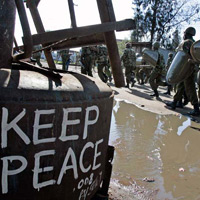
Listen to the Podcast (MP3) >>
The next president will face an unprecedented array of foreign policy demands upon taking office in January. The urgent national security challenges are the most visible among them, with Iraq and Afghanistan topping the list. But Pakistan, the ongoing Arab-Israeli conflagration, Iran, North Korea, Russia, Sudan, Somalia, and the global financial crisis will also cry out for immediate attention.
Layered on top of these immediate challenges are growing threats that provide the backdrop for new and more complex crises—climate change, resource scarcity, the global food and energy crises, urbanization, and sweeping demographic shifts. These trends are placing enormous pressure on the ability of individuals, families, and communities to save, plan, and in some cases survive. Combined, they threaten to spawn sweeping insecurity that could further undermine global stability.
The next administration will also be compelled to manage a host of transnational threats that transcend borders and undermine our collective global security, including terrorism, global pandemics, money laundering, illicit trade, and crime and drug syndicates. Taken together, global trends and transnational threats serve as force multipliers that expand poverty and fuel conflicts.
The challenges facing the United States are so many and so diverse that the only way the next president can avoid leaping from crisis to crisis is to position America to get ahead of the curve. The next president can enhance our standing in the world, sustain our security, and protect our investments by implementing robust prevention strategies to complement the foreign policies that are, due to necessity, geared toward immediate crises. By failing to do so, the next president would ensure that our sustainable security remains elusive.
Merely reacting to global crises is a costly strategy in terms of both human lives and direct financial costs. In order to get out ahead and prepare itself to face the challenges of the 21st century, the United States should:
- Fully integrate prevention into the national strategies that guide foreign policy formulation and implementation.
- Build an integrated, interagency mechanism for long-range strategic planning that is tied directly to the allocation of resources.
- Organize the government to support prevention and ensure coherence across the executive branch.
- Invest intelligence, diplomatic, and economic resources in the most vulnerable areas and regions.
- Re-engage with the international community, and improve and then support international treaties and norms.
- Develop new tools and capabilities for crisis management.
- Address the resource and staff shortages of civilian agencies, particularly the State Department and the United States Agency for International Development.
| Sustainable Security – A 21st Century Approach to Defense |

